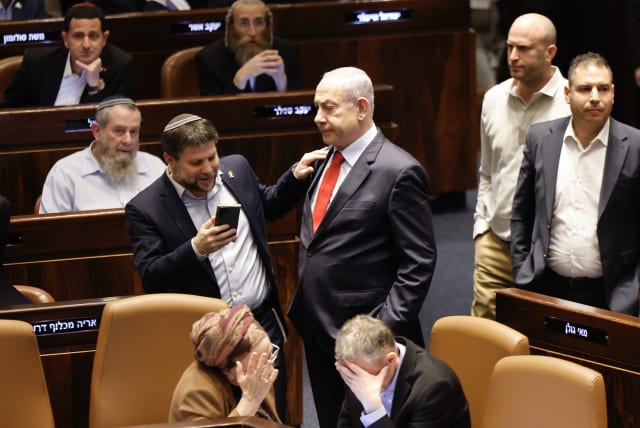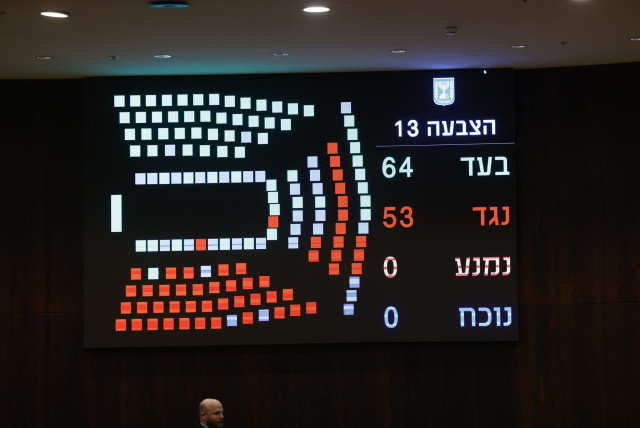Israel's Knesset passes national budget as Netanyahu reaches last-minute deal

In an unexpected development, Agriculture Minister Dichter threatened to not support the budget over cuts to agricultural research, leading to an announced delay.
The renewed budget for 2024 passed into law on Wednesday, after weeks of debate in the Knesset Finance Committee.
NIS 55 billion out of the extra funding will go to military purposes, and NIS 15.5 billion for civilian needs. The budget deficit is predicted to be 6.6%, as opposed to the original 2.5% in the former budget.
A budget deficit occurs when total government expenditures exceed government revenue. The larger a deficit, the more quickly a country's debt may grow.
The Knesset approved in December a law that raised the deficit ceiling from 2.75% to 3.7%, allowing for a bigger deficit in 2023 following the increased budgetary needs from the war. After the vote passed, Finance Minister Bezalel Smotrich said that the new budget is aimed at "winning the war, supporting reservists, strengthening the Israeli home front, and continuing to grow the Israeli economy. Together, with God's help, until victory."
Opposition leader MK Yair Lapid said in a statement that the budget was the "most sectorial, disconnected, and irresponsible budget that the state of Israel ever passed."
כעת בשידור חי: דיונים מוועדות ומליאת הכנסת https://t.co/ZbSIMUOkgl
— ערוץ כנסת (@KnessetT) March 12, 2024

Budget on the line
"This will be the last budget the government passes. For the next budget there will be a government that will pass a budget that will care for the Israeli middle class, reservists, business owners, career officers, and young parents," Lapid said.
The voting was delayed at the last minute in the Knesset plenum on Wednesday, after a number of coalition members threatened not to vote in favor of the budget if last-minute changes were not implemented.
The first to threaten not to support the budget was Agriculture and Rural Development Minister Avi Dichter (Likud), over a provision to cut an important agricultural research organization, the Volcani Institute, by 25%. Likud MK David Bitan reportedly joined Dichter for the same reason.
According to Ynet, a third Likud MK, Amit Halevi, conditioned his vote in favor of the budget on a pledge to pass a bill proposal of his regarding education ministry oversight of schools in east Jerusalem. Likud MK Yuli Edelstein was also not present in the Knesset, as he is mourning over the death of his mother.
The budget needed 61 votes to pass, and National Unity's 12 Knesset members announced that they will oppose the budget. Therefore, the absence of four MKs from the 64-member pre-war coalition was a threat that needed to be taken seriously.
Voting was supposed to commence at 12:00 p.m. on Wednesday after a 25-hour long marathon debate, concluded by Finance Minister Bezalel Smotrich. However, instead of Smotrich, Communications Minister Shlomo Karhi took the dais and spoke for over an hour in an attempt to delay voting.
In the meanwhile, Smotrich gave a statement to the media outside the Knesset plenum.
"We will soon bring to the plenum a good war budget. I have no intention to surrender to all kinds of special interest extortionists, and the budget will not be opened at the last moment. This is my budgetary responsibility. I call on the prime minister to announce that he too intends not to surrender to political extortion, and bring the budget to a vote as is."
The plenum eventually began voting at approximately 2:00 p.m. This included hundreds of votes on the provisions of the budget and on many reservations filed by the oppositions. Dichter at first was not present, but later joined the plenum after saying in a statement that he had received a promise from Prime Minister Benjamin Netanyahu to solve the "crisis in the agriculture ministry" by Passover (April 22).
Labor MK Gilad Kariv argued on the Knesset floor that this amounted to a change to the budget and needed additional approval. Prime Minister Benajmin Netanyahu responded that no agreement was reached but that "discussions were taking place." This led many Knesset members from the opposition to claim that Dichter and Netanyahu had contradicted each other, and that any verbal promises for funding needed to be made available to the public. Knesset speaker Amir Ohana, however, continued with the voting, and the budget passed into law shortly after.
The Knesset's Science and Technology Committee held an emergency meeting on Tuesday to discuss the funding cuts made to the Volcani Institute, which committee chair MK Ayman Odeh said was a death sentence for the institution. Deputy Agriculture and Urban Development Minister Moshe Abutbul, who represented the ministry in the emergency meeting, explained that cuts to the institute are part of wider cuts to the ministry, and that the ministry is reluctant to cut funding to farmers whose businesses have been harmed by the war.
Following the budget's passage on Wednesday, Abutbul wrote on X, "I strengthen the hands of the my friend the dear minister Avi Dichter, who acted and is acting tirelessly to prevent the broad cut to the ministry that was proposed in the budget, and thus saved harm to Israel's farmers, in the most difficult time to the branch, and the dear farmers are standing and working courageously despite the war, at the borders in the north and south, and care for fresh Israeli agricultural produce that brings food security to the people of Israel."
Earlier this week, Knesset Finance Committee chairman MK Moshe Gafni (United Torah Judaism) blocked voting on number of tax provisions aimed at increasing the 2024 national income, such as a new tax on Israel's central banks, and these were not included in the budget and have yet to arrive on the Knesset floor. Gafni did this in order to protest what he argued was insufficient funding for the haredi school systems. These are likely to pass later on in an additional bill when the dispute is resolved.
The dispute centers around Gafni's demand to include the haredi semi-private and private school systems in a reform that passed in 2008 called "Ofek Hadash" (Hebrew for "New Horizon"), which offers an increase in teacher's salaries and additional benefits that depend on extracurricular work hours and other parameters. Gafni insists that the haredi teachers deserve to be paid the same as non-haredi teachers, but the reform also requires education ministry oversight and other components that he is unwilling to accept.
Jerusalem Post Store
`; document.getElementById("linkPremium").innerHTML = cont; var divWithLink = document.getElementById("premium-link"); if (divWithLink !== null && divWithLink !== 'undefined') { divWithLink.style.border = "solid 1px #cb0f3e"; divWithLink.style.textAlign = "center"; divWithLink.style.marginBottom = "15px"; divWithLink.style.marginTop = "15px"; divWithLink.style.width = "100%"; divWithLink.style.backgroundColor = "#122952"; divWithLink.style.color = "#ffffff"; divWithLink.style.lineHeight = "1.5"; } } (function (v, i) { });
